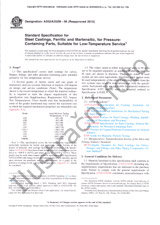Potřebujeme váš souhlas k využití jednotlivých dat, aby se vám mimo jiné mohly ukazovat informace týkající se vašich zájmů. Souhlas udělíte kliknutím na tlačítko „OK“.
ASTM D3801-20a
Standard Test Method for Measuring the Comparative Burning Characteristics of Solid Plastics in a Vertical Position (Includes all amendments and changes 9/11/2020).
Přeložit název
NORMA vydána dne 1.9.2020
Informace o normě:
Označení normy: ASTM D3801-20a
Datum vydání normy: 1.9.2020
Kód zboží: NS-1004627
Počet stran: 9
Přibližná hmotnost: 27 g (0.06 liber)
Země: Americká technická norma
Kategorie: Technické normy ASTM
Kategorie - podobné normy:
Zápalnost a hořlavost materiálů a výrobků
Plastické hmoty obecně
Anotace textu normy ASTM D3801-20a :
Keywords:
burning characteristics, flammability, plastics, small-scale burning tests, solid, vertical burning tests,, ICS Number Code 13.220.40 (Ignitability and burning behaviour of materials and products), 83.080.01 (Plastics in general)
Doplňující informace
| Significance and Use | ||||||||||||||||||||||||
|
5.1 The tests results represent afterflame and afterglow time in seconds for a material of specified shape, under the conditions of this test method. 5.2 The effect of material thickness, color additives, and possible loss of volatile components is measurable. 5.3 The results, when tabulated, are potentially useful as a reference for comparing the relative performance of materials and as an aid in material selection. 5.4 In this procedure, the specimens are subjected to one or more specific sets of laboratory test conditions. Different test conditions will likely result in changes in the fire-test-response characteristics measured. Therefore, the results are valid only for the fire-test-exposure conditions described in this test method. |
||||||||||||||||||||||||
| 1. Scope | ||||||||||||||||||||||||
|
1.1 This fire-test-response standard covers a small-scale laboratory procedure for determining comparative burning characteristics of solid-plastic material, using a 20-mm (50W) premixed flame applied to the base of specimens held in a vertical position. Note 1: This test method and the 20 mm (50W) Vertical Burning
Test (V-0, V-1, or V-2) of ANSI/UL 94 are equivalent.
Note 2: This test method and Test Method B of IEC 60695–11–10
are equivalent. IEC 60695–11–10 has replaced ISO 1210.
Note 3: For additional information on materials that burn up
to the holding clamp by this test method, see Test Method
D635. For test methods of
flexible plastics in the form of thin sheets and film, see Test
Method D4804. For additional
information on comparative burning characteristics and resistance
to burn-through, see Test Method D5048.
1.2 This test method was developed for polymeric materials used for parts in devices and appliances. The results are intended to serve as a preliminary indication of their acceptability with respect to flammability for a particular application. The final acceptance of the material is dependent upon its use in complete equipment that conforms with the standards applicable to such equipment. 1.3 The classification system described in the appendix is intended for quality assurance and the preselection of component materials for products. 1.4 It is possible that this test is applicable to nonmetallic materials other than plastics. Such application is outside the scope of this technical committee. 1.5 This test method does not cover plastics when used for building construction, finishing or contents such as wall and floor coverings, furnishings, decorative objects etc. In addition, the fire resistance (in terms of an hourly rating), flame spread, smoke characterization and heat release rate are not evaluated by this test. Other fire tests exist and shall be used to evaluate the flammability of materials in these intended end use product configuration. 1.6 The values stated in SI units are to be regarded as standard. No other units of measurement are included in this standard. 1.7 This standard is used to measure and describe the response of materials, products, or assemblies to heat and flame under controlled conditions, but does not by itself incorporate all factors required for fire hazard or fire risk assessment of the materials, products, or assemblies under actual fire conditions. 1.8 This standard does not purport to address all of the safety concerns, if any, associated with its use. It is the responsibility of the user of this standard to establish appropriate safety, health, and environmental practices and determine the applicability of regulatory limitations prior to use. 1.9 This international standard was developed in accordance with internationally recognized principles on standardization established in the Decision on Principles for the Development of International Standards, Guides and Recommendations issued by the World Trade Organization Technical Barriers to Trade (TBT) Committee. |
||||||||||||||||||||||||
| 2. Referenced Documents | ||||||||||||||||||||||||
|
Doporučujeme:
Aktualizace technických norem
Chcete mít jistotu, že používáte pouze platné technické normy?
Nabízíme Vám řešení, které Vám zajistí měsíční přehled o aktuálnosti norem, které používáte.
Chcete vědět více informací? Podívejte se na tuto stránku.




 Cookies
Cookies
